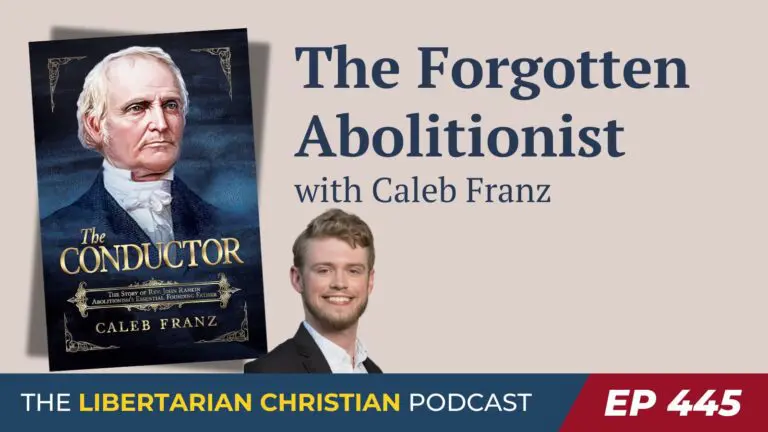

Back in 2011, Jon Stewart created a 19 Question Challenge to show why libertarianism fails. Those questions have echoed for more than a decade, often repeated as if they settled the debate once and for all.
But when examined through the lens of Christian libertarianism, a different picture emerges. Each “failure” turns out to be a misunderstanding—of liberty, justice, and human nature itself. The truth is that libertarianism doesn’t fail because it rejects order; it fails in the minds of those who confuse coercion with compassion.
Below are the 19 questions Jon Stewart asked—and how they reveal not why libertarianism fails, but why biblical liberty works.
Liberty and order aren’t opposites. The Bible recognizes the necessity of civil governance but does not grant special rights to those in authority. Civil government can serve justice, but when it becomes the source of law instead of its servant, it becomes tyranny. Freedom is not something government grants—it’s something government continually erodes.
This argument has become shorthand for why libertarianism fails. Yet roads and safety nets existed long before centralized bureaucracies. Markets, communities, and churches already coordinate complex projects without state planners. True freedom means cooperation by consent, not by coercion.
Markets don’t pick losers; individuals make choices with their money and time. In a moral society, those who fall on hard times are supported by voluntary charity, family, and faith-based institutions. Government welfare replaces compassion with dependency—creating permanent poverty and a political class that feeds on it.
Libertarians affirm society—what they reject is collectivism. Society is voluntary; collectivism is forced. Real community thrives on mutual respect and love of neighbor, not on bureaucratic oversight. A biblical vision of society depends on covenant, not compulsion.
Critics say the free market is “survival of the fittest.” This is an oversimplification, but even so, does that mean the opposite would be preferable? Do we want to reward inefficiency and failure? That is actually what we have now. The state rewards inefficiency and punishes productivity, while free markets reward creativity, service, and virtue. In truth, liberty is not a struggle for dominance—it’s an environment where cooperation outperforms coercion.
This is political gaslighting at its finest. Saying “we are the government” is like saying “we robbed ourselves” when taxed. A Christian libertarian view rejects this moral sleight of hand. Accountability cannot exist when power is monopolized and insulated from personal responsibility.
This question gets to the moral core of why libertarianism fails, at least according to its critics. If government is evil, they argue, then libertarians must oppose all law and order. But that’s a straw man. The issue isn’t whether government exists, but what kind of government we’re talking about. Scripture acknowledges legitimate governance—the role of administering justice and protecting the innocent. What it condemns is the abuse of power, the rule of man elevated above the rule of law, and the use of coercion against those who’ve harmed no one.
Evil in the political sphere doesn’t come from governance itself; it comes from the initiation of force. When a state compels obedience through threats, it crosses a moral line. As Jacob noted in the episode, justice, charity, and defense are all good ends—but when pursued by
Defending liberty doesn’t require empire. Communities can organize defense voluntarily, just as they coordinate trade or security. The Bible supports self-defense and just protection—but never perpetual war or standing armies built on taxation and conscription.
This argument is often presented as historical proof of why libertarianism fails. Critics claim the United States “tried small government once” and it collapsed under the Articles of Confederation. But that narrative oversimplifies history. The Articles didn’t fail—they were abandoned. The states functioned independently and cooperatively without the heavy hand of a central authority. What frustrated nationalists like Hamilton wasn’t chaos, but the inability to raise taxes and build a standing army. The so-called “failure” was really the federal government’s frustration that it couldn’t consolidate power.
The Constitution didn’t fix a broken system—it centralized it. The shift from a loose confederation to a strong union was a transfer of sovereignty from local communities to distant rulers, paving the way for empire, perpetual war, and debt. Even if the Articles had flaws, the remedy wasn’t more power at the top, but more accountability below. In hindsight, America’s brief experiment with true decentralization remains the closest the nation ever came to voluntary federation—a system where liberty was preserved precisely because power was limited.
This question is still used as proof of why libertarianism fails. Yet most local fire departments already rely on voluntary support and private contracting. People willingly pay for services that benefit them. The IRS doesn’t put out fires—neighbors and communities do.
Corporations can’t imprison or conscript anyone. Governments can—and often do. Markets answer to customers; governments answer to donors and lobbyists. When corporations act unjustly, people can walk away. When government does, there’s no alternative.
Healthcare is often used as proof of why libertarianism fails, but the crisis we have today isn’t the result of free markets—it’s the consequence of government intervention. Long before the Affordable Care Act, healthcare was already burdened with layers of subsidies, mandates, and licensing laws that drove up costs and locked out competitors. When Washington stepped in even further, prices soared, quality dropped, and choice disappeared.
What happened wasn’t deregulation but regulatory capture. Powerful hospital networks, insurance giants, and pharmaceutical companies shaped the very rules meant to “regulate” them, using government power to secure their market share. Instead of protecting patients, those laws protected monopolies. Healthcare didn’t prove that liberty fails—it proved that coercion always does.
Stewart frames libertarianism as nostalgia. But liberty isn’t about returning to the past—it’s about applying timeless principles in the present. Modern comfort and freedom aren’t opposites; they’re the natural result of innovation unshackled from central control.
It’s more of a snarky joke than an argument for why libertarianism fails. The joke misses the point. Innovation doesn’t come from bureaucrats—it comes from entrepreneurs. Without government interference, human creativity flourishes. The world doesn’t need permission to progress.
This myth often serves as the centerpiece for claims about why libertarianism fails. The story goes that during the Gilded Age, a lack of government oversight allowed industrial tycoons to exploit workers, crush competitors, and form monopolies. But history tells a different story. The so-called “robber barons” didn’t rise because markets were unregulated—they rose because regulation was captured.
Powerful businessmen like Rockefeller and Vanderbilt lobbied politicians to pass laws and regulations that protected their interests, raised costs for competitors, and restricted market entry. This process, known as regulatory capture, allowed corporate elites to use the state as a weapon to entrench their dominance. In other words, monopolies weren’t born out of laissez-faire capitalism but out of government privilege.
When the state intervenes, it inevitably favors those with the resources to influence it. Antitrust laws later tried to “fix” the very distortions that government itself created, replacing one monopoly with another—the political monopoly of the state. True free markets punish inefficiency and reward service; captured markets reward proximity to power. The lesson isn’t in why libertarianism fails, but that coercion always corrupts competition.
Libertarians aren’t anti-union—they’re against coercive unions. Workers should organize freely without special legal privileges or taxpayer funding. Voluntary association protects labor better than bureaucratic favoritism ever could. This is not why libertarianism fails, but why it succeeds
In truth, many unions were crushed by government—not corporations. State-backed corporations and police powers often worked together to suppress dissent. In a free society, abusive employers lose workers and reputation. Coercion always protects power, not people.
Government didn’t end segregation—it enforced it. Jim Crow laws were state mandates, not market choices. Businesses that refused customers based on race lost money; the state ensured they could do so anyway. Markets reward cooperation, while governments legislate division.
The final question assumes accountability is possible within a monopoly of power. But history tells another story. Every empire claims accountability until its power grows beyond control. As Lysander Spooner argued, the Constitution either authorized our current tyranny or failed to prevent it. The only real accountability is decentralization and voluntary governance.
Across all 19 questions, the claim why libertarianism fails collapses under scrutiny. Each critique assumes that coercion produces order and that moral good can be achieved through force. Yet biblical libertarianism teaches that true justice flows from individual responsibility, not state power.
Libertarianism doesn’t fail because it lacks compassion—it succeeds because it restores compassion to where it belongs: the human heart. The only thing that truly fails is the belief that freedom requires rulers.
Ep. 104 — Why Liberty is Actually a Spiritual Responsibility, Not Just a Political Preference
https://libertarianchristians.com/episode/ep-104-why-liberty-is-important/
Frames liberty as a Christian duty—great on justice vs. coercion.
Ep. 105 — How Anarchy Works: 4 Reasons Private Law is Better Than the State
https://libertarianchristians.com/episode/ep-105-how-anarchy-works-4-reasons-private-law-is-better-than-the-state/
Concrete mechanisms for non-state law and why monopolies underperform.
Ep. 103 — Without the State, It’ll Be Anarchy!! And That’s a Good Thing, Actually
https://libertarianchristians.com/episode/ep-103-without-the-state-itll-be-anarchy-and-thats-a-good-thing-actually/
Answers “chaos” objections; perfect follow-up to Stewart’s premise.
Ep. 100 — Christian Anarchy Is Going Mainstream (And That’s a Good Thing)
https://libertarianchristians.com/episode/ep-100-christian-anarchy-is-going-mainstream-and-thats-a-good-thing/
Context for why these debates keep resurfacing—and how to answer them.
Ep. 89 — What Is Biblical Anarchy? Christian Politics and the Justified Use of Force
https://libertarianchristians.com/episode/ep-89-what-is-biblical-anarchy-christian-politics-and-the-justified-use-of-force/
Definitions, Romans 13 guardrails, and when force is morally justified.
Ep. 106 — Has America Ever Fought a Just War? (R.T. Hadley)
https://libertarianchristians.com/episode/ep-106-has-america-ever-fought-a-just-war-r-t-hadley-how-christians-fight-tyranny/
Sharpens the defense/war questions that come up in Stewart’s list.
Is Libertarianism Left-Wing or Right-Wing?: A Debate on Liberty’s True Nature
https://libertarianchristians.com/episode/is-libertarianism-left-wing-or-right-wing-a-debate-on-libertys-true-nature/
Preps listeners for common left/right critiques of libertarianism.
How to Reclaim Culture Without the Ring of Power: Reforming Christianity and Natural Law (Greg Baus)
https://libertarianchristians.com/episode/reclaim-culture-greg-baus/
Building culture without state power—answers “but who will…?” worries.
You Are The Power and Christ is King (Spike Cohen)
https://libertarianchristians.com/episode/you-are-the-power-and-christ-is-king-with-spike-cohen/
Practical activism under Christ’s lordship; decentralization in action.



















































Sign up and receive updates any day we publish a new article or podcast episode!